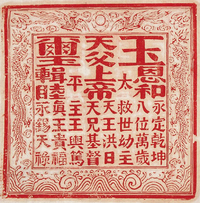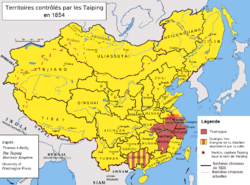Heavenly Kingdom of Taiping
| The Heavenly Kingdom of Great Peace | ||||||||||
|
太平天囯 Tàipíng Tiānguó |
||||||||||
|
||||||||||
|
Greatest extent (maroon) of the Taiping Heavenly Kingdom.
|
||||||||||
| Capital | Tianjing (天京) | |||||||||
| Languages | Chinese | |||||||||
| Religion |
Official: God Worshipping Unofficial:
|
|||||||||
| Government | Heterodox Christian Theocratic Absolute Monarchy | |||||||||
| Taiping Heavenly King (太平天王) | ||||||||||
| • | 1851–1864 | Hong Xiuquan | ||||||||
| • | 1864 | Hong Tianguifu | ||||||||
| Kings | Feng Yunshan (South King) | |||||||||
| Yang Xiuqing (East King) | ||||||||||
| Xiao Chaogui (West King) | ||||||||||
| Wei Changhui (North King) | ||||||||||
| Shi Dakai (Flank King) | ||||||||||
| Historical era | Qing dynasty | |||||||||
| • | Jintian Uprising | January 11, 1851 | ||||||||
| • | Capture of Nanking | March 1853 | ||||||||
| • | Tianjing Incident | 1856 | ||||||||
| • | Death of Hong Tianguifu | November 18, 1864 | ||||||||
| Currency | Holy Treasure (聖寶 shengbao) (cash) | |||||||||
|
||||||||||
| Today part of |
|
|||||||||
| Taiping Heavenly Kingdom | |||||||||||

Royal seal of the Taiping Heavenly Kingdom
|
|||||||||||
| Traditional Chinese | 1 | ||||||||||
|---|---|---|---|---|---|---|---|---|---|---|---|
| Simplified Chinese | |||||||||||
| Literal meaning |
Heavenly Kingdom of Great Peace Greatly Peaceful Heavenly Kingdom |
||||||||||
|
|||||||||||
The Taiping Heavenly Kingdom, officially The Heavenly Kingdom of Great Peace, was an oppositional state in China from 1851 to 1864, supporting the overthrow of the Qing dynasty by Hong Xiuquan and his followers. The unsuccessful war it waged against the Qing is known as the Taiping Rebellion. Its capital was at Tianjing (present-day Nanjing).
A self-proclaimed convert to Christianity, Hong Xiuquan led an army that controlled a significant part of southern China during the middle of the 19th century, eventually expanding to a size of nearly 30 million people. The rebel kingdom announced social reforms and the replacement of Confucianism, Buddhism, and Chinese folk religion by his form of Christianity, holding that he was the second son of God and the younger brother of Jesus. The Taiping areas were besieged by Qing forces throughout most of the rebellion. The Qing government defeated the rebellion with the eventual aid of French and British forces.
In the mid-19th century, China under the Qing dynasty suffered a series of natural disasters, economic problems, and defeats at the hands of the Western powers—in particular, the humiliating defeat in 1842 by the British in the First Opium War. The war disrupted shipping patterns and threw many out of work. It was these disaffected who flocked to join the charismatic visionary Hong Xiuquan.
...
Wikipedia


